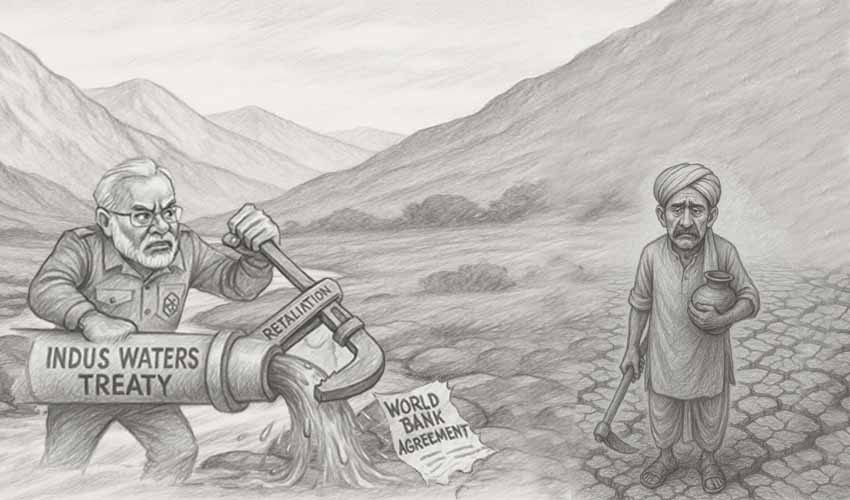So, India has decided to play dirty. Blaming Islamabad for Tuesday’s tragic tourist attack near Pahalgam in Indian Illegally Occupied Jammu and Kashmir (IIOJK), New Delhi responded by announcing a number of hostile measures against Pakistan, most upsettingly the suspension of the Indus Waters Treaty—marking a dangerous escalation in the ongoing Pakistan-India water dispute. The so-called retaliation appears nothing less than state-sponsored hysteria, and shows that rulers in India are slipping.
The Rashtriya Swayamsevak Sangh (RSS)-backed government in New Delhi has slammed every door it could find. Pakistani diplomats and nationals have been told to leave within 48 hours, the integrated check post at Attari stands bolted, and SAARC visas shredded. Even defense attaches have been shown the door, with their access cards probably deactivated mid-sip of office tea. This move comes just as tensions flare over river water rights in South Asia, particularly with the Indus Waters Treaty under direct threat.
What raises eyebrows is that India chooses this insane path while hosting United State Vice President JD Vance. The situation almost seems unscripted, that is, if the obvious is ignored. Still, Pakistan has no option but to play by the new rules.
With elections in the state of Bihar just months away, Indian Prime Minister Narendra Modi wants to look strong. It has been the Modi government’s modus operandi to treat Pakistan as a punching bag whenever the Bharatiya Janata Party’s (BJP) popularity shakes. But they are overplaying their hand this time.
First things first, the Indus Waters Treaty is not an article in the Indian constitution that it can suspend or abrogate unilaterally. The binding agreement is backed by policy and global guarantees, which is the very reason the treaty has survived wars. Suspending it would be tantamount to a grave violation, casting doubt on all such international laws. India’s unilateral suspension of a World Bank-brokered water treaty could set a dangerous precedent in regional geopolitics, especially concerning transboundary rivers. If such withdrawals are allowed to become the new norm, the next dam might not be on the Indus but on the Brahmaputra.
It is high time for New Delhi to come to its senses and shun its senseless warmongering values lest it does untold damage to regional peace. Pakistan, on the other hand, must also resist the urge to react impulsively. If India can walk out on a global agreement and weaponized rivers in broad daylight, Islamabad must act wisely and take the matter back to the World Bank
New Delhi must think long and hard about how this adventurism ends. The statement that “it is easy to start a war but difficult to end it” does sound clichéd, but still holds weight. And wars are always ugly, causing massive losses to all sides involved.
It is high time for New Delhi to come to its senses and shun its senseless warmongering values lest it does untold damage to regional peace. Pakistan, on the other hand, must also resist the urge to react impulsively. If India can walk out on a global agreement and weaponized rivers in broad daylight, Islamabad must act wisely and take the matter back to the World Bank.
The water conflict between Pakistan and India must now be re-evaluated under international law, especially as Modi’s government continues to frame water as a strategic tool. Regional and global allies must be rallied to build pressure on New Delhi, through every available legal and diplomatic channel. If the Modi government insists it has the right over Pakistan’s waters, it should be made to pay the political cost in full.



























